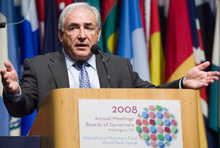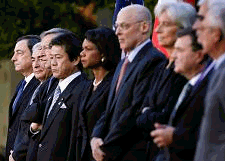
Typical street scene in Santa Ana, El Salvador. (Photo: iStock)
IMF Survey: World Must Act Together to Limit Crisis Damage—IMF
October 13, 2008
- World going through most dangerous financial crisis since 1930s
- Coordinated action will ensure world gets through "with economies intact"
- Progress at weekend's meetings, but more needed to limit damage to real economy
Coordinated global action is starting to reverse the tide of the financial crisis, but governments also need to "deploy all instruments" to limit damage to the real economy, IMF Managing Director Dominique Strauss-Kahn told world financial leaders meeting in Washington.

Strauss-Kahn addresses Annual Meetings: "Governments have already been prepared to break with precedent and try new approaches" (IMF photo)
GLOBAL FINANCIAL CRISIS
"Until this weekend, the collapse in confidence in the markets has been almost matched by a collapse in confidence between countries. We saw a very bad trend toward unilateral measures taken with national interests in mind. Now things are beginning to turn around ... and, as far as we can see this morning, the results in Asian and European markets look good," Strauss-Kahn said in a speech at the end of the October 10-13 IMF-World Bank Annual Meetings.
But he said there was still a long way to go to stabilize financial markets and revive the battered world economy. "Action in the financial markets is essential, but it is not sufficient. We also need to deploy all of the instruments of modern macroeconomic policy to limit the damage to the real economy," he stated.
The IMF will take the lead to draw lessons from the crisis and recommend further action to restore confidence and stability.
World has learned from 1930s
In an address to the IMF's Board of Governors, Strauss-Kahn said that the world was going through the most dangerous financial crisis since the Great Depression of the 1930s. But because of lessons learned, the world now had the economic tools to "emerge from this crisis with our economies and our societies intact."
During the weekend, world financial and political leaders meeting in Washington and Paris put together a series of plans and statements to combat the financial crisis and restore confidence in the global financial system hit by a severe credit crunch triggered initially by the collapse in the United States of the subprime mortgage market.

Strauss-Kahn (second l ) with G-7 leaders in White House Rose Garden: Government responses to crisis increasingly comprehensive (IMF photo)
Leaders of the Group of Seven (G-7) advanced economies, the 15 members of the euro zone, the International Monetary and Financial Committee (IMFC), representing the IMF's 185 member countries, and the Group of 20, which represents both advanced and developing economies, all agreed statements on the need for coordinated action around the world.
New approaches
Strauss-Kahn said governments were willing to break with precedent and try new approaches to end the downward spiral in markets. "Increasingly, these approaches are comprehensive, attacking all aspects of financial market problems: liquidity, bad assets, shortage of capital, and especially confidence," he said.
The centerpiece of the G-7 plan is a stronger than ever commitment to use all available tools to support systemically important financial institutions. The plan outlines specific mechanisms that countries can use to support the system, jump-start credit, and restore confidence.
Euro zone countries announced they would buy into banks to boost their finances and guarantee inter-bank lending until the end of next year. British Prime Minister Gordon Brown said after leaving the meeting "I believe that in the next few days confidence in the banking system will be restored."

Strauss-Kahn addresses IMF-World Bank Annual Meetings plenary session: "This weekend is just the beginning of a long effort" (IMF photo)
Strauss-Kahn said that the worldwide response did not have to be uniform but should be coordinated. "We still have a very long way to go. We don't all need to have the same policies, but we must all talk to each other about our policies, and consider the effects of our actions on our partners. This weekend is just the beginning of a long effort."
Spurring real economy
Strauss-Kahn said action was needed to limit damage to the real economy. Growth in the world economy is projected in the IMF's latest World Economic Outlook to slump to around three percent in 2009. The IMF managing director outlined how advanced economies, emerging markets, and developing countries should react.
• Advanced economies should use "fiscal policy when they can." The most obvious use of fiscal policy is to ease pressures where they are greatest: in the financial and housing sectors. But governments that can afford it should also be ready to undertake a broader fiscal stimulus. Scope exists to use monetary policy to support growth, building on the collaborative easing of interest rates already implemented by central banks.
• Emerging economies have differing degrees of freedom to act. Some can afford to draw reserves down to finance a temporary and sudden shortfall in capital flows. Others will need to raise policy interest rates in line with rising risk premia to stem outflows and bolster confidence in their currencies. Some may need very substantial help, including from the IMF. "We have plenty of liquidity," Strauss-Kahn said.
• Developing countries face reduced export demand and reduced access to trade credit. And many are already suffering from the other crisis—the food and fuel crisis that has strained budgets and balances of payments, and raised inflation and living costs. Strauss-Kahn committed IMF help to countries in difficulty and said the Fund was ready to lend quickly. He urged developed countries not to cut aid budgets because of the financial crisis.
Learning lessons
Strauss-Kahn said the crisis in financial markets was the result of three failures: a regulatory and supervisory failure in advanced economies; a failure in risk management in the private financial institutions; and a failure in market discipline mechanisms.
"Preventing a recurrence of these failures will require an international effort, because borders do not confine financial institutions or keep out financial turmoil," he said.
The IMFC has asked the Fund to take the lead in drawing the necessary policy lessons from the current crisis and recommending effective actions to restore confidence and stability. It will work with the Financial Stability Forum, the G-20, and others, and is scheduled to report to the IMFC at the latest at its next meeting, which will be in April.
Comments on this article should be sent to imfsurvey@imf.org







